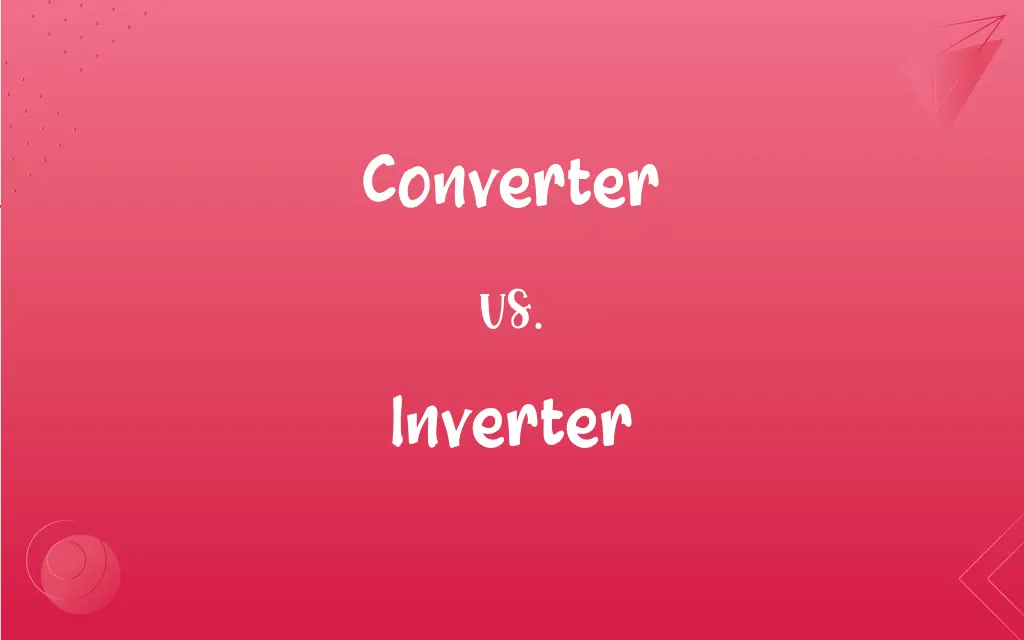Converter vs. Inverter: What's the Difference?
Edited by Aimie Carlson || By Janet White || Published on January 6, 2024
A converter changes the voltage level of electricity while maintaining the same type (AC to AC or DC to DC), whereas an inverter converts electricity from DC to AC.

Key Differences
A converter is a device that changes the voltage of an electrical power source, either stepping it up or down, but it doesn't alter the current type (AC to AC or DC to DC). An inverter, on the other hand, changes direct current (DC) into alternating current (AC), enabling the use of household appliances on DC power sources.
Converters are commonly used in electronic devices to adapt to different voltage levels, such as in travel adapters that adjust voltage to suit various country standards. Inverters are crucial in systems where the power source is DC, like solar panels or car batteries, to convert power for AC devices.
Converters usually have a simpler design as they only change the voltage level. In contrast, inverters are more complex due to the need to convert current type, often requiring sophisticated circuitry to generate AC waveform from DC.
Energy efficiency in converters depends on the type and quality of the voltage conversion. Inverters typically have efficiency losses during the conversion process from DC to AC, influenced by factors like load and inverter design.
Converters are widely used in battery chargers, electronic gadgets, and electric vehicles for voltage regulation. Inverters are key in renewable energy systems, off-grid power systems, and portable power generators, providing AC electricity from DC sources.
ADVERTISEMENT
Comparison Chart
Primary Function
Changes voltage level
Converts DC to AC
Usage
Used in adapting to different voltage standards
Converts DC sources to usable AC power
Technical Complexity
Generally simpler design
More complex due to AC waveform generation
Energy Efficiency
Efficiency varies with voltage conversion
Efficiency losses during DC to AC conversion
Applications
Common in chargers and electronic devices
Essential in renewable energy and off-grid systems
ADVERTISEMENT
Converter and Inverter Definitions
Converter
A device that changes the voltage level of electrical power.
The converter enabled the European appliance to work in the U.S. outlet.
Inverter
Integral in renewable energy systems for power conversion.
The solar power system’s inverter efficiently converts DC to AC.
Converter
Essential in adapting electronic devices to different voltages.
Travelers often carry converters for their electronic gadgets.
Inverter
A device that converts direct current (DC) to alternating current (AC).
The inverter allows the solar panels to power home appliances.
Converter
Can be used for both AC to AC and DC to DC conversions.
The converter in the car adapted the 12V DC to a usable level for charging.
Inverter
Can vary in size and capacity based on application.
Industrial inverters can handle higher power loads than residential ones.
Converter
Converts electricity within the same current type.
He used a converter to step down the voltage for his device.
Inverter
Enables the use of AC devices on DC power sources.
We used an inverter to run our television off a car battery during the camping trip.
Converter
Common in battery chargers and power supplies.
The laptop's power supply has a built-in converter for voltage regulation.
Inverter
Often used in off-grid and portable power systems.
For our remote cabin, the inverter is key to using solar-generated electricity.
Converter
A furnace in which pig iron is converted into steel by the Bessemer process.
Inverter
One that inverts or produces inversion.
Converter
A machine that converts electric current from one kind to another.
Inverter
A device used to convert direct current into alternating current.
Inverter
An electronic device whose output reverses the sign of its input current or voltage, thereby shifting the phase of alternating current signals by 180 degrees. Also called phase inverter.
Inverter
Something that inverts, or causes inversion.
Inverter
(electrical engineering) A power inverter.
Inverter
An electrical converter that converts direct current into alternating current
FAQs
How does an inverter work?
An inverter converts DC electricity into AC electricity.
Is an inverter necessary for solar panels?
Yes, to convert the DC power from solar panels to AC for home use.
What types of appliances need inverters?
Appliances that require AC power but are powered by DC sources need inverters.
Can a converter change DC to AC?
No, a converter only changes the voltage level, not the current type.
Do converters affect the efficiency of devices?
Yes, efficiency can be impacted by the quality and type of the converter.
What is a converter used for?
A converter is used to change the voltage level of electrical power.
Is it safe to use inverters with sensitive electronics?
Pure sine wave inverters are safer for sensitive electronics.
Can converters be used internationally?
Yes, especially travel converters for adapting to different country voltage standards.
How do you choose the right inverter for a solar system?
Consider the system's power requirements and inverter capacity.
Are converters used in electric vehicles?
Yes, for voltage regulation and adapting the power supply.
Do inverters produce pure AC power?
Some inverters produce pure sine wave AC, similar to grid power, while others produce modified sine wave.
Are all converters portable?
Many are, but size and portability vary based on their use.
Can a converter step up voltage as well as step it down?
Yes, some converters can both step up and step down voltage.
What factors affect inverter efficiency?
Load, inverter design, and quality of components affect efficiency.
How long do inverters last?
Inverter lifespan varies but typically ranges from 5 to 15 years.
What determines the size of a converter?
The power requirement of the device it is being used with.
Do converters work with all types of currents?
Converters are specific to AC to AC or DC to DC conversions.
Can a converter be used for charging batteries?
Yes, especially if it includes a DC to DC conversion.
Do inverters need maintenance?
Basic maintenance like cleaning and ensuring adequate ventilation is recommended.
Can inverters run heavy appliances like refrigerators?
Yes, if the inverter has sufficient capacity.
About Author
Written by
Janet WhiteJanet White has been an esteemed writer and blogger for Difference Wiki. Holding a Master's degree in Science and Medical Journalism from the prestigious Boston University, she has consistently demonstrated her expertise and passion for her field. When she's not immersed in her work, Janet relishes her time exercising, delving into a good book, and cherishing moments with friends and family.
Edited by
Aimie CarlsonAimie Carlson, holding a master's degree in English literature, is a fervent English language enthusiast. She lends her writing talents to Difference Wiki, a prominent website that specializes in comparisons, offering readers insightful analyses that both captivate and inform.
































































